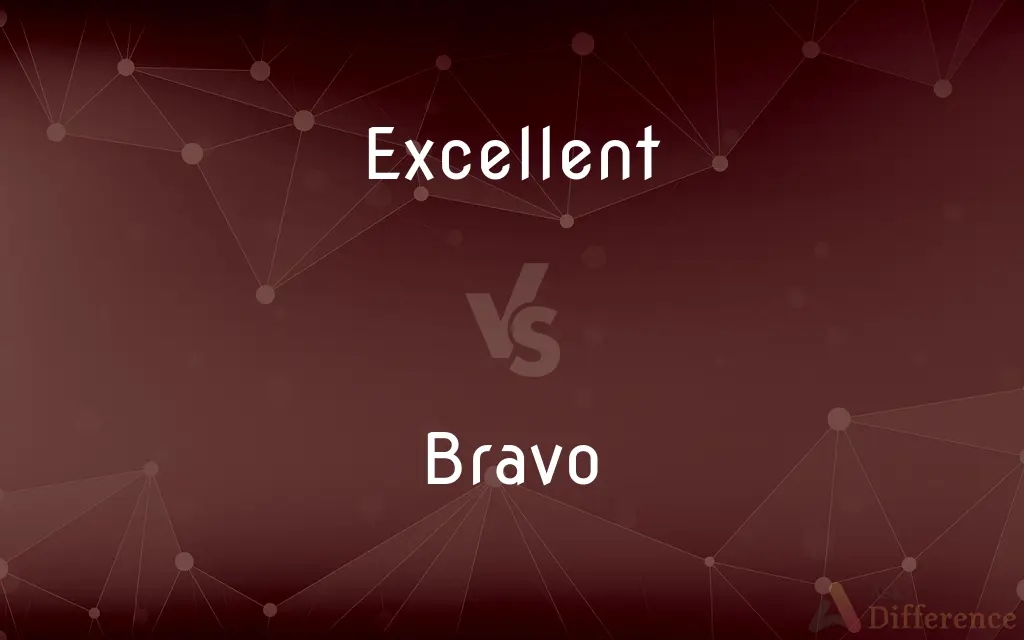Excellent vs. Bravo — What's the Difference?
Edited by Tayyaba Rehman — By Urooj Arif — Updated on March 29, 2024
"Excellent" is an adjective describing superb quality, while "Bravo" is an exclamation applauding a good performance.

Difference Between Excellent and Bravo
Table of Contents
ADVERTISEMENT
Key Differences
"Excellent" refers to something of outstanding quality, indicating that something or someone far exceeds standards or expectations. It can be used in various contexts, from academics to culinary arts, to denote superiority or high distinction. For instance, an "excellent" report card signifies top grades across subjects, emphasizing the achiever's comprehensive skill or knowledge. On the other hand, "Bravo" is an interjection used to express approval, typically after a performance. It's a way to vocally appreciate someone's effort or talent, often heard in theaters, concerts, or any performance space. "Bravo" can be directed towards both individuals and groups, acknowledging their successful presentation or artistic achievement.
While "excellent" serves as a descriptive term that can apply to a broad range of subjects including objects, individuals, and abstract concepts, "Bravo" is specifically used in the context of reacting to performances or efforts, serving not just as a commendation but also as an encouragement to the performer(s).
The usage of "excellent" and "Bravo" also reflects the context of communication: "excellent" is often found in written feedback, academic assessments, and formal evaluations, while "Bravo" is primarily used in verbal expressions of enthusiasm and support during or immediately after a performance.
Understanding the difference between "excellent" and "Bravo" is crucial for appropriate application. Using "excellent" acknowledges the high quality or superior nature of an act, work, or trait, while shouting "Bravo" is a way of actively participating in the celebration of a performance, making it more of an immediate, emotional response.
Comparison Chart
Nature
Adjective
Exclamation
ADVERTISEMENT
Usage
Describes high quality or merit.
Used to applaud or praise performances.
Context
Broad, applicable to various subjects.
Specific to performance and artistic contexts.
Communication
Often written or spoken in formal evaluations.
Primarily verbal, expressing immediate approval.
Intent
Acknowledgment of superiority.
Encouragement and appreciation of effort or talent.
Compare with Definitions
Excellent
Of outstanding quality; extremely good.
She received an excellent score on her exam.
Bravo
A shout of approval, especially after a performance.
The audience yelled Bravo! after the stunning performance.
Excellent
Used to commend achievements or qualities.
Your idea is excellent!
Bravo
Used to express admiration for someone's success.
Bravo! Your presentation was captivating.
Excellent
Reflects a high degree of merit or distinction.
She has an excellent record of service.
Bravo
An exclamation of encouragement.
Bravo, keep up the good work!
Excellent
Used to indicate approval or pleasure
‘What a lovely idea! Excellent!’
Bravo
Celebrates artistic or performative achievement.
Bravo! What a remarkable display of talent.
Excellent
Of the highest or finest quality; exceptionally good for its kind
Enjoyed an excellent meal at the restaurant.
Bravo
A villain, especially a hired killer.
Excellent
(Archaic) Being so to an extreme degree.
Bravo
Indicates enthusiastic approval.
Bravo! That was a clever solution.
Excellent
Having excelled, having surpassed.
Bravo
Used to express approval, especially of a performance.
Excellent
Superior, or significantly better than others.
The chef prepared an excellent meal.
Bravo
A shout or cry of "bravo."
Excellent
Describing something that achieves high standards.
His work ethic is excellent.
Bravo
To express approval of by shouting "bravo."
Excellent
Extremely good; outstanding
Their results are excellent
The lorry was in excellent condition
Bravo
To shout "bravo."
Excellent
Of higher or the highest quality; splendid.
Bravo
A hired soldier; an assassin; a desperado.
Excellent
Exceptionally good of its kind.
Bravo
A shout of "bravo!"
Excellent
Superior in kind or degree, irrespective of moral quality.
Bravo
(international standards) nodot=1 NATO/ICAO Phonetic Alphabet.}}
Excellent
(obsolete) Excellently.
Bravo
Used to express acclaim, especially to a performer.
Bravo, you have done a brilliant job!
Excellent
Excelling; surpassing others in some good quality or the sum of qualities; of great worth; eminent, in a good sense; superior; as, an excellent man, artist, citizen, husband, discourse, book, song, etc.; excellent breeding, principles, aims, action.
To love . . . What I see excellent in good or fair.
Bravo
To cheer or applaud, especially by saying bravo!
Excellent
Superior in kind or degree, irrespective of moral quality; - used with words of a bad significance.
Their sorrows are most excellent.
Bravo
A daring villain; a bandit; one who sets law at defiance; a professional assassin or murderer.
Safe from detection, seize the unwary prey.And stab, like bravoes, all who come this way.
Excellent
Excellently; eminently; exceedingly.
Bravo
Well done! excellent! an exclamation expressive of applause.
Excellent
Of the highest quality;
Made an excellent speech
The school has excellent teachers
A first-class mind
Bravo
A murderer (especially one who kills a prominent political figure) who kills by a treacherous surprise attack and often is hired to do the deed;
His assassins were hunted down like animals
Assassinators of kings and emperors
Bravo
A cry of approval as from an audience at the end of great performance
Bravo
Applaud with shouts of `bravo' or `brava'
Common Curiosities
Can "excellent" be used to describe a person?
Yes, it can describe a person's qualities, achievements, or performance in a particular area.
Can "Bravo" be used for non-performative achievements?
While traditionally associated with performances, "Bravo" can be used informally to celebrate any accomplishment.
Does "Bravo" have different forms?
Yes, "Brava" for females and "Bravi" for groups, though "Bravo" is often used universally in English.
Is "Excellent" only used in academic contexts?
No, "excellent" can describe anything of superior quality, from personal traits to products and services.
Is it appropriate to use "Bravo" in formal writings?
"Bravo" is mostly used in spoken language. In formal writing, other terms of praise or congratulations might be more appropriate.
Can "excellent" and "Bravo" be used together?
Yes, they can be used together, especially in feedback or reviews, e.g., "Your performance was excellent. Bravo!"
Is "Bravo" used in all types of performances?
While common in live performances like theater and music, its use can extend to any performance context where immediate audience reaction is customary.
How does the audience use "Bravo" in a performance?
"Bravo" is shouted by the audience to express their appreciation and admiration for the performance, typically at the end.
How do you respond to someone saying "Bravo"?
A simple thank you or acknowledgment is appropriate, showing appreciation for the recognition.
Why is "excellent" considered a strong compliment?
It denotes a high level of quality or achievement, implying that the recipient's work or effort stands out significantly.
Can "excellent" be used in casual conversation?
Yes, it's frequently used to express high approval or satisfaction in both formal and casual contexts.
Can "excellent" be used sarcastically?
Like many adjectives, it can be used sarcastically, depending on tone and context.
How does culture affect the use of "Bravo"?
Its use is widespread across cultures with Western theatrical traditions, and it's understood in many languages as a sign of performance appreciation.
How do "excellent" and "Bravo" reflect the speaker's attitude?
Using "excellent" shows admiration for quality or achievement, while "Bravo" demonstrates enthusiastic approval and encouragement.
Is there a limit to using "Bravo"?
It should be used when genuinely impressed by a performance, to maintain its significance as a form of praise.
Share Your Discovery

Previous Comparison
Strategist vs. Consultant
Next Comparison
Nitch vs. NicheAuthor Spotlight
Written by
Urooj ArifUrooj is a skilled content writer at Ask Difference, known for her exceptional ability to simplify complex topics into engaging and informative content. With a passion for research and a flair for clear, concise writing, she consistently delivers articles that resonate with our diverse audience.
Edited by
Tayyaba RehmanTayyaba Rehman is a distinguished writer, currently serving as a primary contributor to askdifference.com. As a researcher in semantics and etymology, Tayyaba's passion for the complexity of languages and their distinctions has found a perfect home on the platform. Tayyaba delves into the intricacies of language, distinguishing between commonly confused words and phrases, thereby providing clarity for readers worldwide.














































